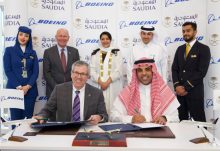 Saudi Arabian Airlines (SAUDIA) and Boeing announced the order of 39 fuel-efficient 787s with options for 10 more airplanes. The national flag carrier will grow its long-haul fleet with the selection of up to 49 787 Dreamliners, utilizing the outstanding efficiency, range and flexibility of the Dreamliner to sustainably grow its global operation. His Excellency Engr. Saleh Al-Jasser said “The expansion in SAUDIA’s fleet supports the continuous growth witnessed by the aviation sector in the Kingdom. The agreement will also contribute to achieving the objectives of the National Transport and Logistic Strategy and the Saudi Aviation Strategy, as well as other national strategies in tourism and Hajj and Umrah. SAUDIA is committed to further strengthening its role by providing high-quality, advanced services in the aviation industry and connecting the world to the Kingdom, in alignment with the Vision 2030.
Saudi Arabian Airlines (SAUDIA) and Boeing announced the order of 39 fuel-efficient 787s with options for 10 more airplanes. The national flag carrier will grow its long-haul fleet with the selection of up to 49 787 Dreamliners, utilizing the outstanding efficiency, range and flexibility of the Dreamliner to sustainably grow its global operation. His Excellency Engr. Saleh Al-Jasser said “The expansion in SAUDIA’s fleet supports the continuous growth witnessed by the aviation sector in the Kingdom. The agreement will also contribute to achieving the objectives of the National Transport and Logistic Strategy and the Saudi Aviation Strategy, as well as other national strategies in tourism and Hajj and Umrah. SAUDIA is committed to further strengthening its role by providing high-quality, advanced services in the aviation industry and connecting the world to the Kingdom, in alignment with the Vision 2030.
His Excellency Engr. Ibrahim Al-Omar, commented, “SAUDIA continues its expansion efforts in all aspects of the airline; whether it’s introducing new destinations or increasing the aircraft fleet. The agreement with Boeing delivers on this commitment and the newly added aircraft will further enable SAUDIA to fulfill its strategic objective of bringing the world to the Kingdom.”
“The deal is in addition to the existing order of 38 new aircraft SAUDIA is expected to receive by 2026, which will increase the current fleet of 142”, he added.
Stan Deal, president and CEO of Boeing Commercial Airplanes said, “The addition of 787 Dreamliners will enable SAUDIA to expand its long-haul service with outstanding range, capacity and efficiency. After more than 75 years of partnership, we are honored by SAUDIA’s confidence in Boeing products and will continue to support Saudi Arabia’s goal to expand sustainable air travel.”
The agreement was signed in the presence of His Excellency the Minister of Transport and Logistics Services, Chairman of the Board of Directors of the Saudi Arabian Airlines Corporation, Engr. Saleh Al-Jasser and Her Royal Highness Reema bint Bandar Al Saud, Ambassador of Saudi Arabia to the United States. It was signed by His Excellency the Director General of Saudi Arabian Airlines Corporation, Engr. Ibrahim Al-Omar and the Senior Vice President, Commercial Sales and Marketing of Boeing, Mr. Brad McMullen. The agreement will include both 787-9 and 787-10 models; The Dreamliner reduces fuel use and emissions by 25% compared to the airplanes it replaces.
SAUDIA currently operates more than 50 Boeing airplanes on its long-haul network, including the, 777-300ER (Extended Range) and 787-9 and 787-10 Dreamliner. The additional 787s perfectly complement SAUDIA’s existing fleet, enabling it to effectively harness the value of both the 777 and 787 families to help realize Saudi Arabia’s strategic goal of becoming a global aviation hub.
The increase in SAUDIA’s fleet will create new job opportunities for pilots, cabin crew, and other operational positions. It’s worth noting that Saudi Aerospace Engineering Industries (SAEI), a subsidiary of SAUDIA Group, will contribute to providing various types of maintenance for the B787 through its capabilities and expertise. SAEI is certified by the General Authority of Civil Aviation (GACA) for performing preventive maintenance, line maintenance, and heavy maintenance, including A-check. Their capabilities extend to B787 engine maintenance as well. The new MRO Village being built at King Abdulaziz International Airport in Jeddah will provide the necessary facilities and capacity to increase the maintenance capabilities for the B787 and other aircraft types.
Fleet expansion is one of the objectives of SAUDIA’s strategic transformation program “SHINE” which focuses on excellence in operational efficiency through the development and management of the network and fleet as well as the integration of maintenance systems. It also focuses on digital transformation with several initiatives aimed at improving the guest travel experience and innovation in providing the best digital products, services, connectivity and infrastructure that enable the continuous growth of the aviation and logistics sectors.
 Tourism Breaking News
Tourism Breaking News


